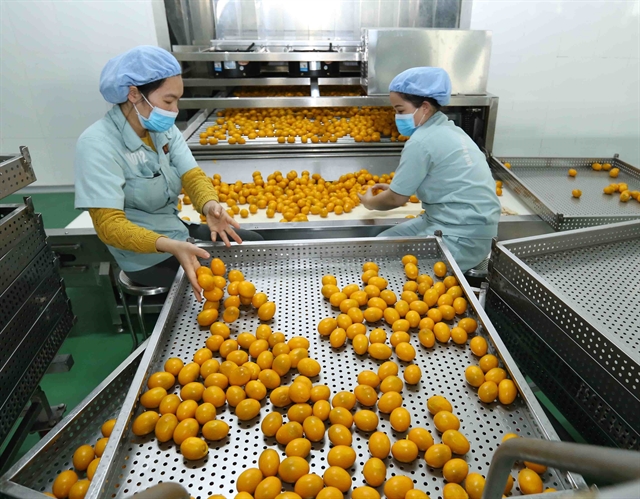 Economy
Economy


|
| Workers checking eggs on a production line of Dabaco. VNA/VNS Photo |
HÀ NỘI — Despite disruptions from the COVID-19 pandemic, higher feed costs and lower meat prices, livestock companies in Việt Nam still recorded positive results thanked to the 3F (feed-farm-food) model. Hence the livestock industry is expected to have a bright growth outlook in the mid- and long-term.
The 3F model, a closed livestock raising method including animal feed, farm and food, is currently a development trend applied by big companies like Masan Group (MSN), Hoà Phát Group (HPG), Dabaco Group (DBC) and Vinamilk (VNM).
Even though Dabaco’s profit dropped over the year due to lower pork prices, its business results during outbreaks of pandemics in animals were still very positive.
In its financial report, the company posted a net revenue of over VNĐ5.07 trillion in the first half of the year, and profit after tax of VNĐ579.9 billion.
Bank for Investment & Development of Vietnam Securities Company (BSC) said that Dabaco’s main revenue growth was driven by the 3F business segment. And the growth of 3F mostly came from the animal feed segment, as well as hog farming and egg production segments.
A report from the Department of Animal Health under the Ministry of Agriculture and Rural Development showed that since the beginning of 2021, African swine fever has been found in 1,498 farms of 50 provinces and cities, forcing the destruction of 93,261 pigs, more than two times higher than the same period in 2020.
However, the closed, high-quality farming model has helped Dabaco not only avoid problems, but also take advantage of opportunities to gain market share.
Dabaco sets a 5-year plan from 2020-2025 to reach the revenue milestone of over $1 billion, equivalent to VNĐ25-30 trillion. To achieve the target, the company will continue to expand its investment portfolio of core projects including feed mills and hi-tech livestock zones in Hòa Bình, Quảng Ninh, Thanh Hóa and Bình Phước provinces and projects on deep processing of agricultural products and food.
Masan Group, one of the leading companies in the food and retail industry, also boosted investment in the closed 3F model to complete the integrated value chain, strictly control quality from production to processing, to product distribution.
The production according to the 3F model has helped Masan manage the source of raw materials, and provide supplies to its own supermarket systems. The company’s livestock products have great advantages as they will be sold at the retail chain VinCommerce, a subsidiary of Masan with nearly 2,500 supermarkets and VinMart/VinMart+ stores.
By doing that, from the end of July 2021, Masan MEATLife JSC, a meat processing plant and Masan's subsidiary, has increased their capacity to ensure a stable food supply for HCM City markets during the implementation of social distancing.
Masan MEATLife supplies 100,000 - 150,000 boxes of cool meat MEATDeli per day, equivalent to 35-50 tons of cool meat per day, to HCM City markets. At the same time, the business also doubled the amount of meat supplied to markets in Hà Nội.
To ensure the supply of raw materials, Masan Group owns a high-tech pig farm in Nghệ An Province with 250,000 hogs per year.
Hoà Phát Group, one of the leading steel producers, also decided to join the sector after seeing its potential.
In 2015, Hoà Phát started investing in the 3F model, in which Hoà Phát Agricultural Development JSC is a unit managing and operating all agricultural business investment activities.
Hoà Phát’s leaders said that it focuses on animal feed and hog, cow and poultry farms, then, depending on market developments, the company will research and invest in processing and distributing food to consumers.
Currently, Hoà Phát’s clean egg output reaches 750,000 eggs per day and has been present in most of the major supermarkets in Hà Nội.
Bright outlook ahead
MB Securities JSC (MBS) said that the livestock industry is very positive in the mid- and long-term.
Việt Nam is likely to become the second-largest pork consumer in Asia, and continues to be one of the world's leading pork consumers per capita, ranking third in Asia after China and South Korea, said the Organization for Economic Cooperation and Development (OECD). The country is expected to surpass South Korea at the end of 2021.
The development of Việt Nam’s pork industry is the main driver of the domestic feed industry. Even though pork prices have been under downward pressure, they are still very high compared to the previous year.
Pork production is expected to increase to 4 million tonnes in 2025 before reaching 4.7 million tonnes in 2030, equivalent to average annual growth of 3.1 per cent during 2021-2030.
In the poultry market, the OECD forecasted the country’s consumption in the next 10 years can reach an average growth of 2.9 per cent per year. The poultry consumption trend in fact continues to increase in many countries around the world.
However, domestic poultry prices are witnessing a downward trend amid COVID-19 and rising animal feed prices.
The animal feed industry also posted strong performance. The country's animal feed production, which reached only 8.5 million tonnes in 2008, surged to 20.5 million tonnes in 2020, with an average growth of about 7.6 per cent/year.
US Department of Agriculture (USDA) said that the size of Việt Nam’s animal feed market is forecasted to grow by 5.06 per cent/year, worth US$12.27 billion in 2025, from $9.124 billion in 2019.
On the stock market, these companies also witnessed good gains. MSN shares closed the last session at VNĐ142,400 per share, up 60.2 per cent compared to the beginning of the year. DBS shares also rose more than 20 per cent this year, while HPG climbed 6.7 per cent. — VNS




